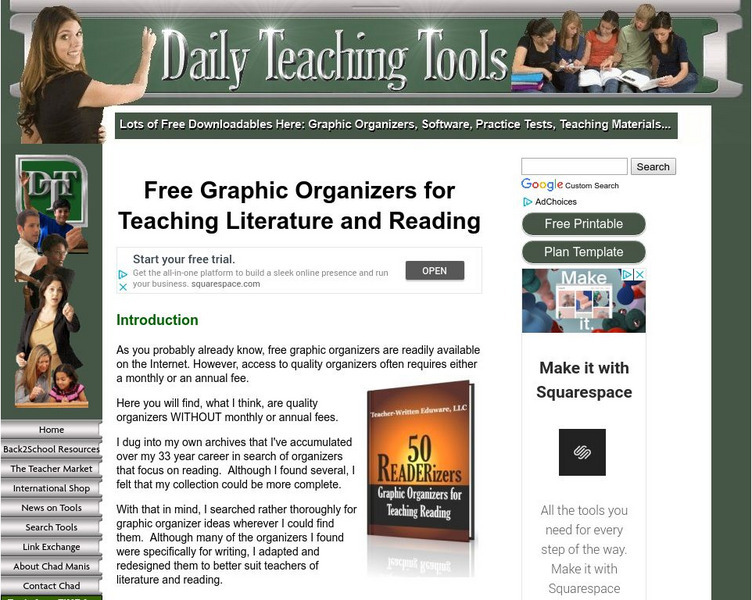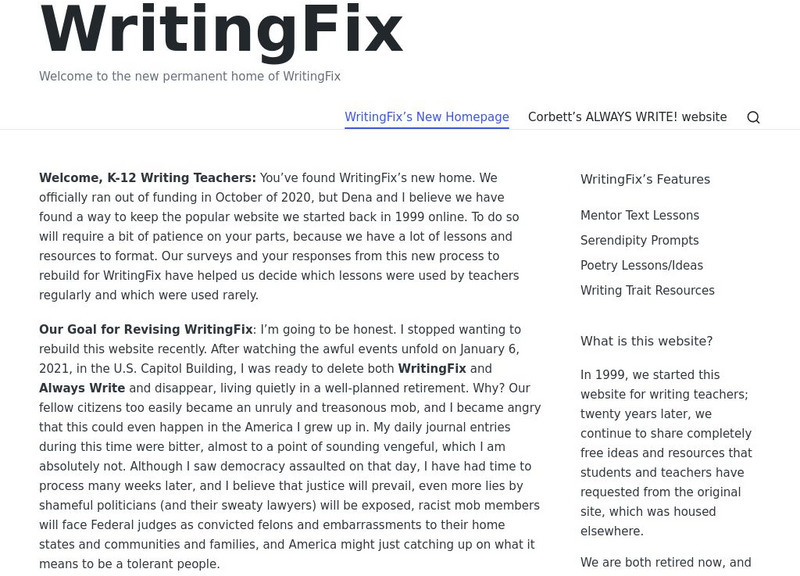Hi, what do you want to do?
Curated OER
Lost Worlds
Students, while using the strategy of identifying the main idea and supporting details, explore the three nonfiction selections of the lost worlds of Machu Picchu high in the Andes Mountains, Great Zimbabwe, and Anasazi. In addition,...
Curated OER
Writing a Tall Tale
Students study the various aspects of tall tales. They read various tall tales and discuss the characteristics and literature aspects of tall tales. Students write their own unique tall tales.
Curated OER
Why Walk?
First graders listen to the book Yummers. They use the food pyramid to evaluate what Emily Pig ate during her walk and find out why her walk made her sick. They participate in a walking game.
Curated OER
Justin and the World's Best Biscuits
Students read Mildred Pitts Walter's, Justin and the World's Best Biscuits and answer associated questions.
Curated OER
Electronic Media
Students compare forms of electronic media. They watch a news broadcast and take notes on the content being conveyed. After viewing the broadcast, they read newspaper articles or news magazines to locate articles with similar content to...
Curated OER
James and the Giant Peach
Fourth graders read James and the Giant Peach, write a chronological narrative, and complete a webquest dealing with the life of Roald Dahl.
Curated OER
The Great Cedar Tree
First graders explore concept of interdependence through production of the play, The Great Cedar Tree.
Curated OER
Show and Teach
Second graders write "how to" sequences for tasks so that another person can follow the sequence to perform the action. They write a "show and teach" once a month for evaluation.
Curated OER
"Kookie Kitties" - Paul Klee: Finger Puppets
Students examine and discuss the painting, Cat and Bird, by Paul Klee. They identify the various types of lines, shapes, and colors in the painting, and design and create finger puppet versions of the animals from the painting.
Curated OER
Biome Web Quest
Third graders create paper mache globes, paint them and label the oceans and the continents. In groups, they research a biome, write about it and create an artistic visual representation of the biome and present it to the class.
Curated OER
Wanted Poster
Students examine a fairy tale character of their choice in great detail. They create a wanted poster that includes the following: a picture of the character, a written description of his/her appearance, a reward amount, and reasonthe...
Curated OER
Exploring the History of Canyon De Chelly: The Navajos
Students are introduced to the novel Sing Down The Moon written by Scott O'Dell. Throughout the book, after each chapter is read, class discussions and journal writing is incorporated into the unit.
Curated OER
There Was Always Sun
Students investigate the chronicles of history about the Negro Leagues baseball by using rare historical footage and interviews with Black baseball greats. Students also examine how to work in groups to use online resources to reinforce...
Curated OER
Journey of the Salmon
Third graders predict salmon migration routes and explore how dams affect the salmon migration. They explore the cultural significance of salmon to the Nez Perce people and design technology to aid salmon migration.
Curated OER
Literary Circles
High schoolers use correct grammar, spelling and capitalization in their writing. They connect information acquired in history and science classes with the events described in the books that were read. Students make a clear and...
Daily Teaching Tools
Daily Teaching Tools: Customizable Graphic Organizers
This Daily Teaching Tools resource provides a series of graphic organizers for reading students. Forms are provided for plot, character analysis, reading logs, and reading responses.
Austin Independent School District
Austin Independent School District: Summary of Fiction and Nonfiction Text [Pdf]
This 31-page document focuses on teaching summarizing strategies for use with fiction and nonfiction texts. This series of lesson plans starts with fiction summarizing strategies such as "Somebody-Wanted-But-So-Then" and "Story Arch."...
Florida Center for Reading Research
Florida Center for Reading Research: Narrative Text Structure: Summary Step Up [Pdf]
A lesson plan in which learners read a narrative text and complete a graphic organizer to show the plot elements of the story. Materials are included.
Nobel Media AB
The Nobel Prize: The Nobel Prize in Literature 1982
At this site from The Nobel Foundation you can read about the 1982 winner of the Nobel Prize in Literature Gabriel Garcia Marquez. This website is organized into the following sections: "Press Release," "Presentation Speech,"...
Nobel Media AB
The Nobel Prize: The Nobel Prize in Literature 1978: Isaac Bashevis Singer
Learn about the 1978 winner of the Nobel Prize in Literature, Isaac Bashevis Singer. This website is organized into the following sections: "Presentation Speech," "Biography," "Nobel Lecture," "Nobel Diploma," and "Other Resources."
Nobel Media AB
The Nobel Prize: The Nobel Prize in Literature 1953
The Nobel Foundation offers information about Sir Winston Churchill (1874-1965 CE) who earned the 1953 Nobel Prize in Literature "for his mastery of historical and biographical description as well as for brilliant oratory in defending...
Nobel Media AB
The Nobel Prize: The Nobel Prize in Literature 1973: Patrick White
Read about the 1973 winner of the Nobel Prize in Literature, Patrick White. This website is organized into the following sections: "Press Release," "Presentation Speech," "Autobiography," "Swedish Nobel Stamps," "Article," and "Other...
Writing Fix
Writing Fix: Writing Fix Homepage
Have you ever needed someone to help you out with your writing? This site offers help to young scholars and teachers. The lessons and resources are organized based on the 6 Writing Traits model. An especially interesting feature of the...





















![Austin Independent School District: Summary of Fiction and Nonfiction Text [Pdf] Professional Doc Austin Independent School District: Summary of Fiction and Nonfiction Text [Pdf] Professional Doc](https://static.lp.lexp.cloud/images/attachment_defaults/resource/large/FPO-knovation.png)
![Florida Center for Reading Research: Narrative Text Structure: Summary Step Up [Pdf] Lesson Plan Florida Center for Reading Research: Narrative Text Structure: Summary Step Up [Pdf] Lesson Plan](https://content.lessonplanet.com/knovation/original/509116-c9c6546ed67fc47f39cd0cad4fb48ffa.jpg?1661786948)




